
Bakharev’s work, capturing unguarded moments of people in Soviet Siberia in the early 1980s, the images, captured in a time and place that feel a world away, speak to the universal human experience of finding joy and connection against all odds, and it’s a conversation I feel compelled to join.
What makes Cheryomushki so utterly compelling is how Bakharev transformed a seemingly mundane setting, a lake beach, into a deeply human archive. His photographs are a poignant dance between raw emotion and quiet defiance, each image a carefully composed fragment of a larger emotional tapestry. His belief that a picture should not be beautiful, but “interesting, then you can find beauty” is a sentiment that cuts deep. As a husband and father, I often find myself searching for that very kind of beauty in the small, chaotic moments of my own life, in the quiet laughter of my kids or the shared meal that Bakharev would find so resonant. This is not merely a collection of historical photos, it is an intimate meditation on nostalgia.
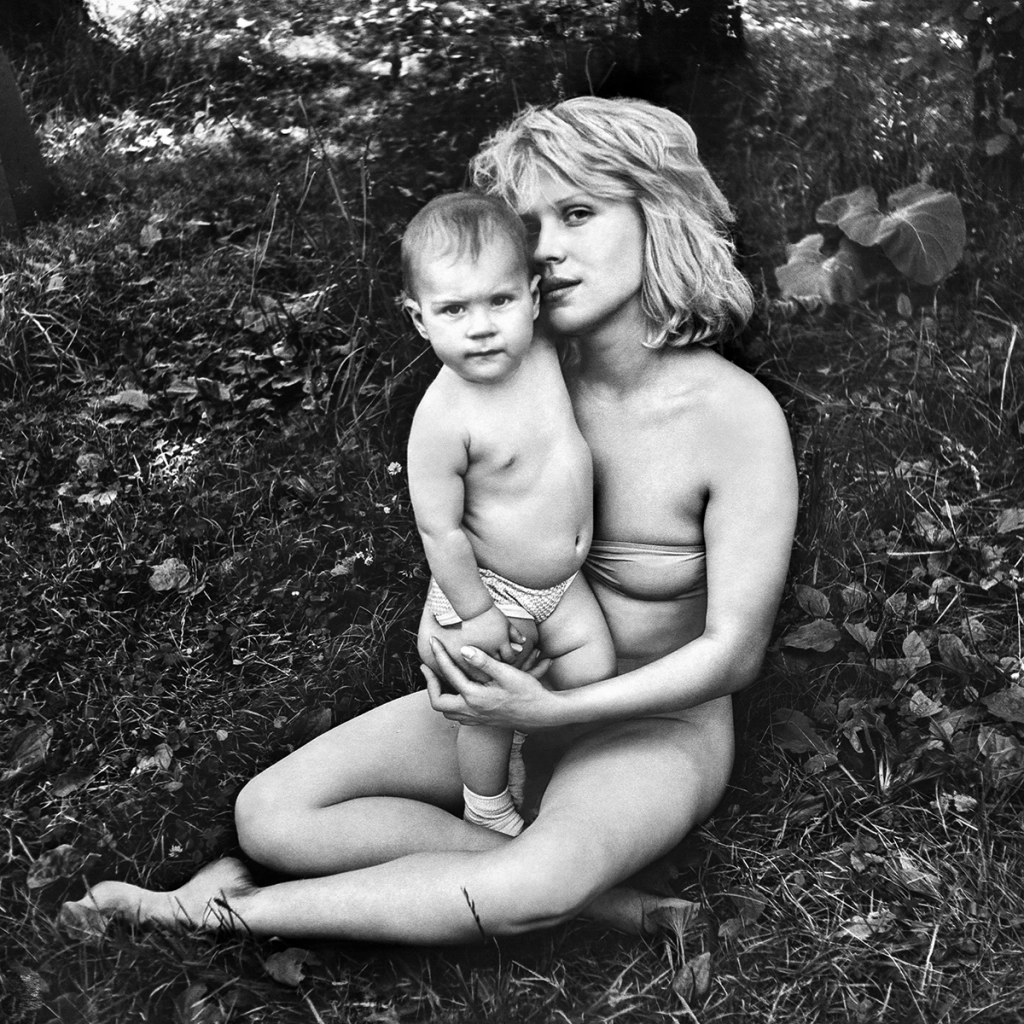
Bakharev’s unique approach, stemming from a life in Soviet Siberia under a strictly regulated artistic environment, makes these images feel not just historically significant, but incredibly personal and resonant. His camera, for him, was a means of connection, a way to build a mutual relationship with his subjects. This is palpable in the final presentation of the book itself, which is a beautifully put-together hardback with a tipped-in photo. Stanley/Barker, as always, has created an exquisite object, one that feels both substantial and intimate in your hands, echoing the very nature of the work it holds. The physicality of the book, its weight and texture, contributes to the profound experience of engaging with Bakharev’s vision and when you open it up and the first page is this bold and powerful font choice, really inspired by a Soviet-era graphic design, similar to some of the propaganda posters and some architectural signs, once again Stanley/Barker absolutely nail the design choices.
There are so many wonderful images in this book, each one a window into the unguarded moments of human life. The work feels intensely personal, and as I move from one photograph to the next, I find myself drawn into a quiet dialogue with each person Bakharev has captured.
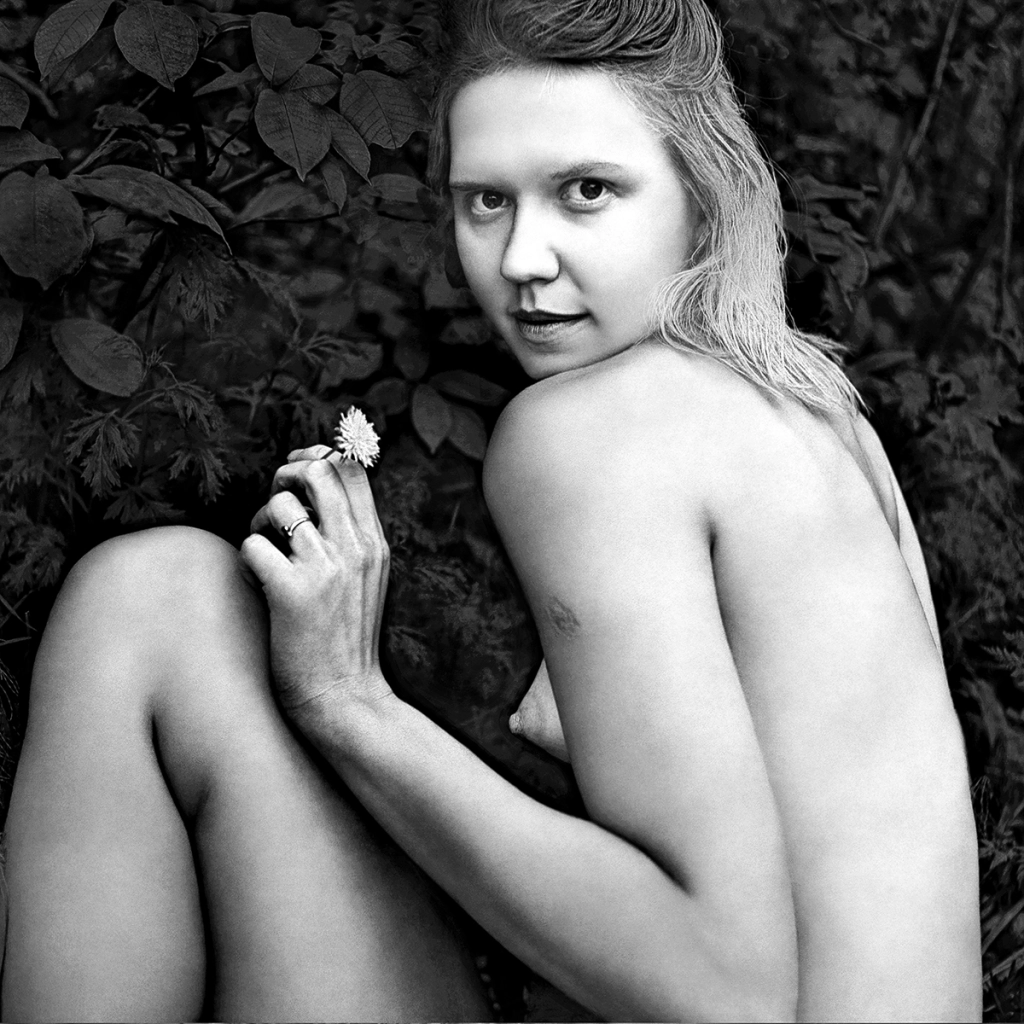
Like this one of a woman seated in a natural setting, holding a dandelion. The calm, almost serene expression on her face, combined with the soft light and the dark foliage, creates a sense of profound tranquillity. She is not posing for us, she is simply existing in a moment of stillness, a quiet pause in the rush of life. It’s a beautiful and subtle reminder of how Bakharev found these intimate truths in the most simple and unassuming of settings.
Then there is the powerful photograph of a family, a father, mother, and young child, in a natural setting. The family members are captured with an almost startling intimacy, their close proximity and unguarded expressions speaking volumes about their shared lives. The father’s and mother’s expressions are a mix of seriousness and deep concern, while the child’s gaze is a quiet and calm reflection of their world. This image reminds me that a family is not just a collection of individuals but a single, living organism bound by an unspoken language of love, concern, and quiet strength.
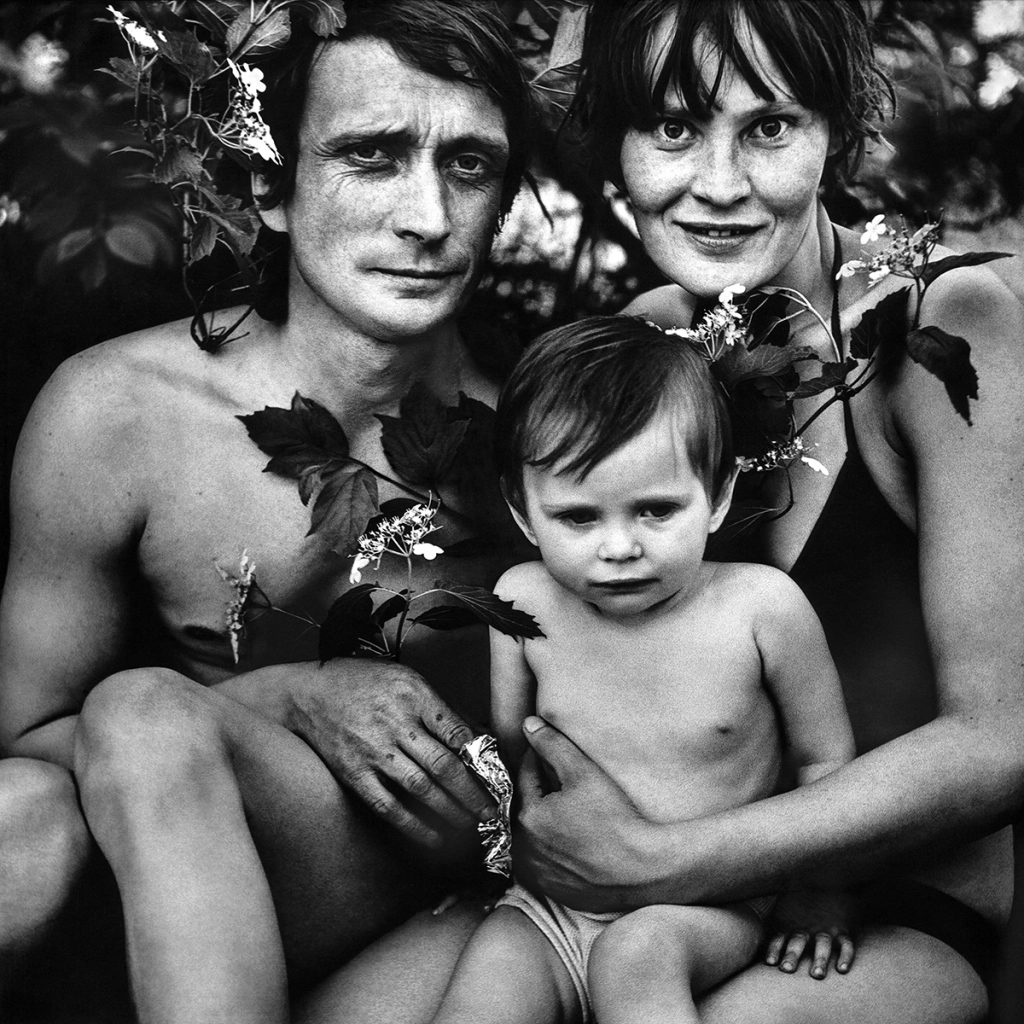
The image of the mother holding her baby is a testament to the primal, unbreakable bond between a parent and child. Looking at them, their expressions of quiet connection, I am reminded of the powerful and emotional weight of fatherhood. This photograph feels both universal and profoundly personal, a poignant look into a private world of affection that Bakharev was uniquely able to document. It inspires me to cherish the small, meaningful moments with my own children, seeing them not as perfect pictures, but as “interesting” in their own right, as Bakharev would say.
The photograph of a person lying face down in the grass is a deeply philosophical and contemplative work. The figure’s posture, combined with the lushness of the leaves, flowers, and grass, creates a sense of vulnerability and connection to the earth. It is an image that seems to ask fundamental questions about our place in the world, about our relationship to nature, and about the raw, unfiltered humanity that exists in moments of solitude and repose.
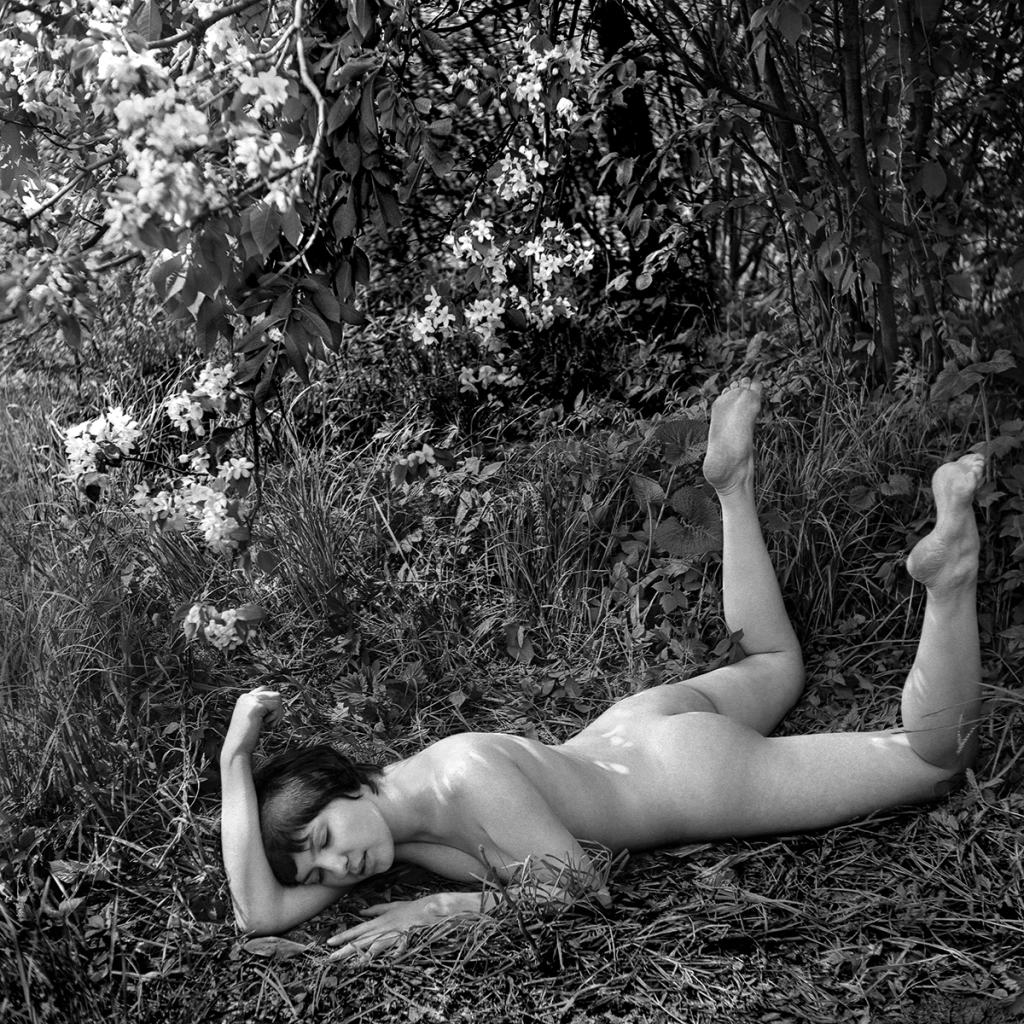
There is also the powerful photograph of a group of people sitting under a tree. The image embodies the profound sense of community and camaraderie that Bakharev found on these beaches. It is a portrait of people in repose, their guards down and their bodies relaxed, a powerful reminder that even in a highly controlled society, people will find a way to create their own spaces of freedom, friendship, and shared humanity. This image reminds me of the bonds I shared with my own friends during my youth, those late night gatherings where we felt like we were the only ones in the world, forging a connection that was as strong as any political ideal.
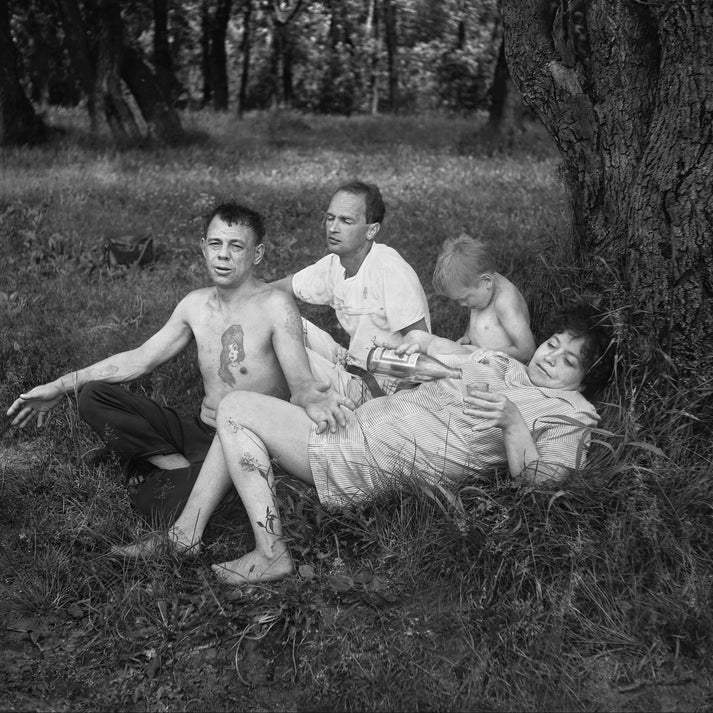
Another image is of a woman handing some flowers to a young boy. It is a testament to the simple and gentle acts of connection that Bakharev was so gifted at capturing. Both figures look happy and content, a quiet moment of joy that feels both universal and profoundly specific to the place and time. It’s a beautiful reminder that even in the most challenging of circumstances, love and connection are forces that cannot be suppressed.
There is a beautiful image of two couples holding each other, with the first couple also holding their son. This is an incredible and intimate look at a family enjoying a day out. The tenderness and affection in their embrace are palpable, a quiet study in companionship and emotional security, a small, defiant act of love set against the impersonal landscape of a vast, political state.
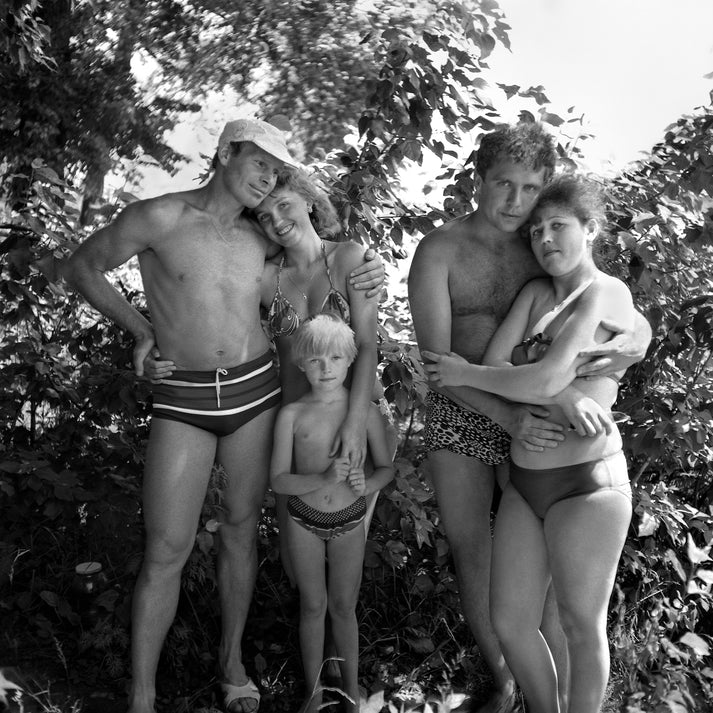
There is the deeply moving image of a father and son looking tired out in their shorts and shoes, sitting in front of the lake. Their posture and expressions are a mix of exhaustion and quiet reflection, a perfect capture of a shared moment at the end of a long day. It’s an incredibly raw and honest look at the bond between a father and son, and the kind of unspoken communication that happens when you are simply present together.
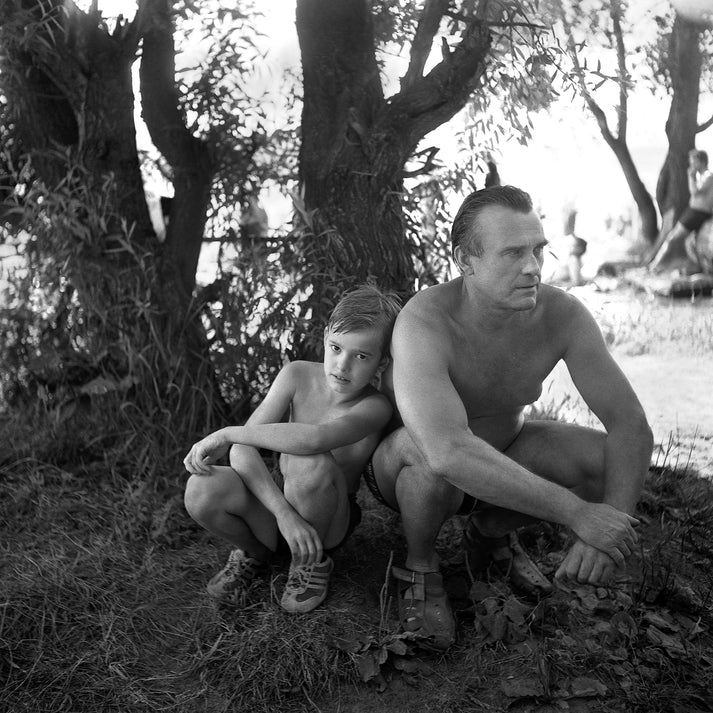
Cheryomushki confronts the viewer with the impermanence of life and the fleeting nature of all human experiences. The people in these photographs are frozen in time, their youth is long gone, paralleling the undeniable passage of time. Now at 47, I’m at a stage where I often reflect on how fast time has passed since my skateboarding days, and these images prompt existential thoughts about aging, legacy, and what I want to pass on to my kids. Bakharev’s subjects aren’t posing for Instagram, they’re real, unfiltered, and often unaware of an audience. This raises questions about authenticity in a world increasingly obsessed with curated images, a feeling I resonate with from my own skateboarding days, which were about raw self-expression, not performing for likes. The book inspires me to cultivate that same sense of authenticity in my own family, encouraging my kids to be themselves, much like Bakharev’s subjects.
Bakharev’s work is a quiet yet powerful form of resistance against conformity, challenging the idea that art must adhere to societal rules. By photographing in a way that defied Soviet norms, he asserted the power of individual expression, much like my own youthful acts of rebellion against mainstream expectations. His images suggest that photography can be a vital, life sustaining means to find meaning amidst the struggle.
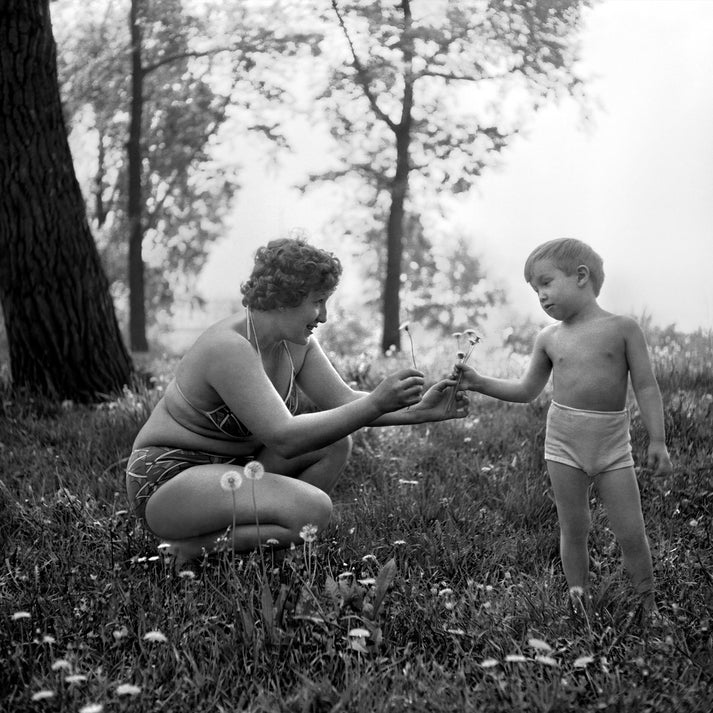
Cheryomushki is not just a book to be seen, but to be felt. It is a work that courageously peels back the layers of a distant political reality to reveal a universal human truth, that sadness and struggle, while often isolating, are also a profound shared experience, and that connection is always a possibility, even in the most unlikely of corners.
Regards
Alex
